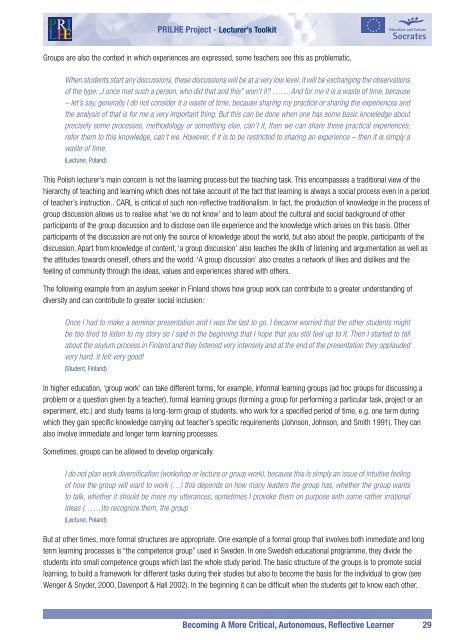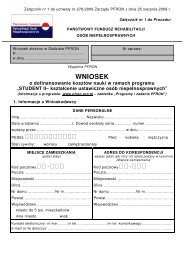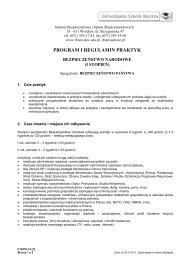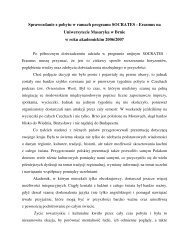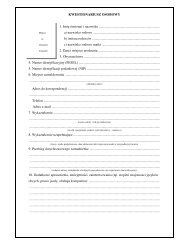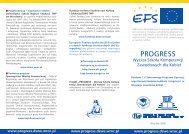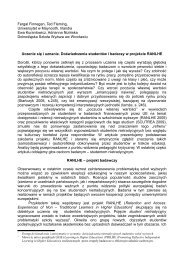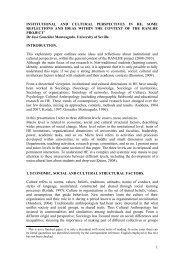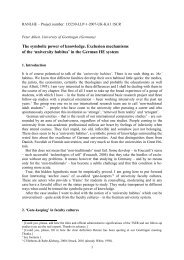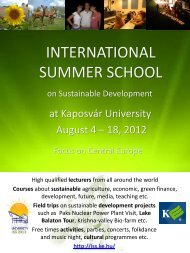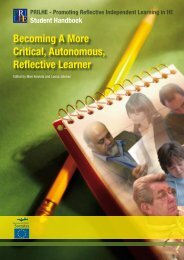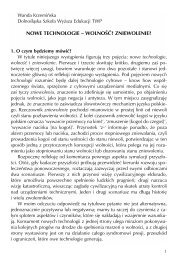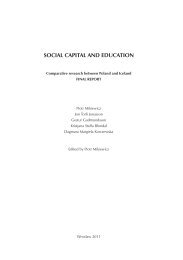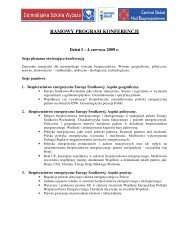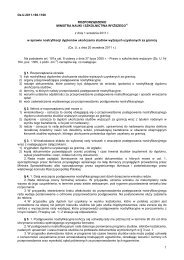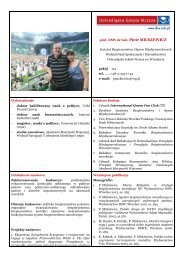Becoming A More Critical, Autonomous, Reflective Learner
Becoming A More Critical, Autonomous, Reflective Learner
Becoming A More Critical, Autonomous, Reflective Learner
Create successful ePaper yourself
Turn your PDF publications into a flip-book with our unique Google optimized e-Paper software.
PRILHE Project - Lecturer’s Toolkit<br />
Groups are also the context in which experiences are expressed, some teachers see this as problematic,<br />
When students start any discussions, these discussions will be at a very low level, it will be exchanging the observations<br />
of the type: „I once met such a person, who did that and this’’ won’t it …….And for me it is a waste of time, because<br />
– let’s say, generally I do not consider it a waste of time, because sharing my practice or sharing the experiences and<br />
the analysis of that is for me a very important thing. But this can be done when one has some basic knowledge about<br />
precisely some processes, methodology or something else, can’t it, then we can share these practical experiences,<br />
refer them to this knowledge, can’t we. However, if it is to be restricted to sharing an experience – then it is simply a<br />
waste of time.<br />
(Lecturer, Poland)<br />
This Polish lecturer’s main concern is not the learning process but the teaching task. This encompasses a traditional view of the<br />
hierarchy of teaching and learning which does not take account of the fact that learning is always a social process even in a period<br />
of teacher’s instruction.. CARL is critical of such non-reflective traditionalism. In fact, the production of knowledge in the process of<br />
group discussion allows us to realise what ‘we do not know’ and to learn about the cultural and social background of other<br />
participants of the group discussion and to disclose own life experience and the knowledge which arises on this basis. Other<br />
participants of the discussion are not only the source of knowledge about the world, but also about the people, participants of the<br />
discussion. Apart from knowledge of content, ‘a group discussion’ also teaches the skills of listening and argumentation as well as<br />
the attitudes towards oneself, others and the world. ‘A group discussion’ also creates a network of likes and dislikes and the<br />
feeling of community through the ideas, values and experiences shared with others.<br />
The following example from an asylum seeker in Finland shows how group work can contribute to a greater understanding of<br />
diversity and can contribute to greater social inclusion:<br />
Once I had to make a seminar presentation and I was the last to go. I became worried that the other students might<br />
be too tired to listen to my story so I said in the beginning that I hope that you still feel up to it. Then I started to tell<br />
about the asylum process in Finland and they listened very intensely and at the end of the presentation they applauded<br />
very hard. It felt very good!<br />
(Student, Finland)<br />
In higher education, ‘group work’ can take different forms, for example, informal learning groups (ad hoc groups for discussing a<br />
problem or a question given by a teacher), formal learning groups (forming a group for performing a particular task, project or an<br />
experiment, etc.) and study teams (a long-term group of students, who work for a specified period of time, e.g. one term during<br />
which they gain specific knowledge carrying out teacher’s specific requirements (Johnson, Johnson, and Smith 1991). They can<br />
also involve immediate and longer term learning processes.<br />
Sometimes, groups can be allowed to develop organically.<br />
I do not plan work diversification (workshop or lecture or group work), because this is simply an issue of intuitive feeling<br />
of how the group will want to work (…) this depends on how many leaders the group has, whether the group wants<br />
to talk, whether it should be more my utterances, sometimes I provoke them on purpose with some rather irrational<br />
ideas (……)to recognize them, the group<br />
(Lecturer, Poland)<br />
But at other times, more formal structures are appropriate. One example of a formal group that involves both immediate and long<br />
term learning processes is “the competence group” used in Sweden. In one Swedish educational programme, they divide the<br />
students into small competence groups which last the whole study period. The basic structure of the groups is to promote social<br />
learning, to build a framework for different tasks during their studies but also to become the basis for the individual to grow (see<br />
Wenger & Snyder, 2000, Davenport & Hall 2002). In the beginning it can be difficult when the students get to know each other.<br />
<strong>Becoming</strong> A <strong>More</strong> <strong>Critical</strong>, <strong>Autonomous</strong>, <strong>Reflective</strong> <strong>Learner</strong> 29


